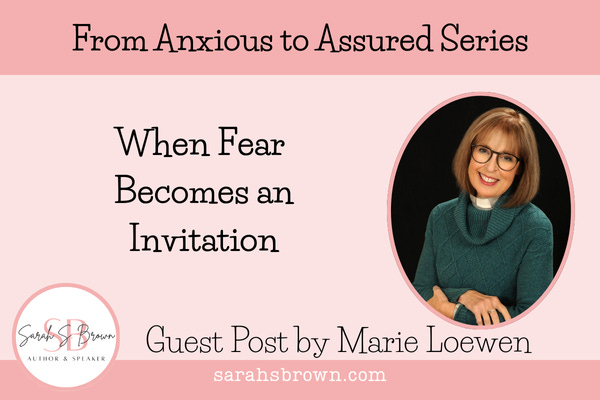God had warned them not to eat of one particular tree.
Adam and Eve had a choice to make. Would they trust that he had their best interests in mind, or would they heed the voice that whispered “Did God REALLY…?” They reached up, took the fruit and ate. With that simple choice, fear slithered into the human experience.
Suddenly they knew they were naked in a world that had transformed from safe to threatening. They were vulnerable. Rather than enjoy their evening walk with God, they now feared him and hid. When he called them forth, they stitched together excuses as flimsy as the fig leaves they used to cover their nakedness.“The woman YOU gave me, God, she gave it to me.” “It was the serpent’s fault.”
Humans have been fearful and hiding or fighting and blaming each other, or God, ever since. Yet, while they, and all humans, have borne the consequences of their decision, God did not abandon them. He sought them out, spoke with them, and even gave them divinely designed leather coats to wear as protection. So much more appropriate than crumbling fig leaves!
Now we live in a world of genuine dangers, and fear has a purpose. We are right to respect things like deep water when we cannot swim, or fire that spreads beyond the firepit. We need to respect the danger of making choices whose consequences might lead to pain or brokenness for ourselves and others.
Healthy fear tells us when something is wrong and helps us avoid danger. Anyone who has lived with teenagers knows what disaster can occur when a sense of invulnerability replaces wise caution.
Yet, repeatedly, the scriptures say “fear not.” And then we read to “fear God.” It can be quite confusing, and I puzzled over it all for quite a while.
Why was Jesus so cross that dark night that the disciples found themselves in a storm? Their boat was small and the waves were big. Surely he could understand their fear? (Matthew 8:26).
I remembered a terrifying day when huge waves battered our own boat with its failed motor. Was Jesus every bit as cross with me? Did he see me as a coward when, like his disciples, my stomach clenched in panic?
And was it sinful to be anxious when unexpected bills began to mount or when the doctor looked grave and said, “I think you need another test…”? I “knew” that God saw fear as sinful. God must be disappointed in my lack of faith.
Then I remembered seeing our little grandson, shivering in fear on the edge of a pool. Grandpa called out, “Don’t be afraid. I will catch you!” I didn’t hear a tone of rebuke or disappointment in Grandpa’s voice, just love, encouragement, and invitation to trust that his Grandpa could and would indeed catch him. I heard an invitation to courage. Why would I think God was less loving?
Was it possible that I was reading the words on the pages of the scriptures in a tone influenced by a view of God that needed correcting?
First, I looked at the Hebrew word for fearing God.I discovered that while the root word for “awe” and “terror/fear” are the same, the actual words differ slightly. To “fear God” does not mean to live in terror of God, but to be in awe. The Creator of our universe cares for even the little sparrows at my bird feeder (Matt. 10:29-32) and moreover, chooses to love individual humans. This should astound us. The psalmists sing repeatedly of the enormity of both God’s power and God’s lovingkindness. We are reassured that if we will jump into the pool of our fears, we will be caught and held in love.
Then I began to watch for the “fear nots” in my daily Bible reading, I noticed something. So far, all of the many “fear nots” I have found have an invitation to allow God to reveal himself, a promise–or both, attached to them.
So we face a decision. Will we choose to trust God in times of fear, to explore the invitations to know him better through times of uncertainty, to trust that God has both the power and the longing to catch us in arms of love? Will we read those “fear nots” as an invitation or rebuke?
To read the “fear nots” of Scripture as an invitation is to be led into deeper trust–a trust that is the seedbed of love. And, says St. John, it is perfect love that casts out fear. (1 John 4:18)
The very first “fear not” in Scripture holds both a promise and an invitation. Abram is in very real danger as God speaks, “Do not be afraid, Abram. I am your shield, your very great reward.” (Genesis 15:1, NIV). God is promising protection, yes, but even more – God promises his very self. The intimacy of that relationship will be the reward of Abram’s trust. Abram still shivered in his sandals at times. There were times of doubt and even failure in his story. Yet in the “Hall of Faithful Heroes,” (Hebrews 12) he has a place of honour.
Fear can be a kind of gift. It can ask us to stop and consider, “What is driving this fear? Where, in this, is God gently inviting me to see both God and myself more clearly? To know him more intimately?”
Lamentations 3:55-60 promises us that God is the one who sees us when we fear we are invisible. Hebrews 13:5,6 reminds us of God’s faithful character and promise that we will never be left or forsaken. In John 14 to 17, we find Jesus’s prayer for us and promises that the Holy Spirit of God will make his home in and with us, bringing us into more than we can ask or imagine.
The little toddler who shivered on the edge of the pool that day gathered his courage and jumped. He was caught and held. Now, almost a teen, he scrambles up the tall ladder to the high diving board and, laughing, bails into the lake. He emerges, dripping and confident and joyful. When we accept the invitations to trust, to grow in knowledge and love of God, who knows what joys and adventures will await us!

This blog post was first published on Sarah S. Brown’s Substack.
